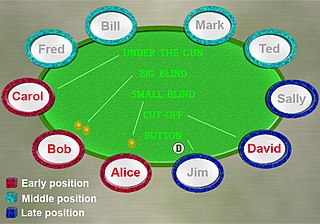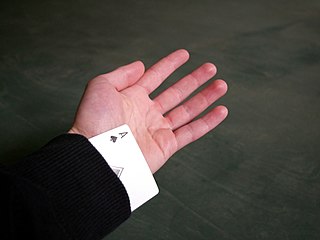Five-card draw is a poker variant that is considered the simplest variant of poker, and is the basis for video poker. As a result, it is often the first variant learned by new players. It is commonly played in home games but rarely played in casino and tournament play. The variant is also offered by some online venues, although it is not as popular as other variants such as seven-card stud and Texas hold 'em.

Poker is a family of comparing card games in which players wager over which hand is best according to that specific game's rules. It is played worldwide, however in some places the rules may vary. While the earliest known form of the game was played with just 20 cards, today it is usually played with a standard deck, although in countries where short packs are common, it may be played with 32, 40 or 48 cards. Thus poker games vary in deck configuration, the number of cards in play, the number dealt face up or face down, and the number shared by all players, but all have rules that involve one or more rounds of betting.
Blinds are forced bets posted by players to the left of the dealer button in flop-style poker games. The number of blinds is usually two, but it can range from none to three.

In the game of poker, the play largely centers on the act of betting, and as such, a protocol has been developed to speed up play, lessen confusion, and increase security while playing. Different games are played using different types of bets, and small variations in etiquette exist between cardrooms, but for the most part the following rules and protocol are observed by the majority of poker players.
Five-card stud is the earliest form of the card game stud poker, originating during the American Civil War, but is less commonly played today than many other more popular poker games. It is still a popular game in parts of the world, especially in Finland where a specific variant of five-card stud called Sökö is played. The word sökö is also used for checking in Finland.
Seven-card stud, also known as Seven-Toed Pete or Down-The-River is a variant of stud poker. Before the 2000s surge of popularity of Texas hold 'em, seven-card stud was the most widely played poker variant in home games across the United States, and in casinos in the eastern part of the country. Although seven-card stud isn't as common in casinos today, it is still played online. The game is commonly played with two to eight players, though eight may require special rules for the last cards dealt if no players fold. With experienced players who fold often, playing with nine players is possible.

Texas hold 'em is one of the most popular variants of the card game of poker. Two cards, known as hole cards, are dealt face down to each player, and then five community cards are dealt face up in three stages. The stages consist of a series of three cards, later an additional single card, and a final card. Each player seeks the best five card poker hand from any combination of the seven cards; the five community cards and their two hole cards. Players have betting options to check, call, raise, or fold. Rounds of betting take place before the flop is dealt and after each subsequent deal. The player who has the best hand and has not folded by the end of all betting rounds wins all of the money bet for the hand, known as the pot. In certain situations, a "split-pot" or "tie" can occur when two players have hands of equivalent value. This is also called a "chop-pot". Texas hold 'em is also the H game featured in HORSE and in HOSE.

Cheating in poker is any behavior outside the rules of poker that is intended to give an unfair advantage to one or more players.

Faro, Pharaoh, Pharao, or Farobank is a late 17th-century French gambling game using cards. It is descended from Basset, and belongs to the Lansquenet and Monte Bank family of games due to the use of a banker and several players. Winning or losing occurs when cards turned up by the banker match those already exposed.
Card players are those participating in a card game. Various names are given to card players based on their role or position.
Caribbean stud poker, also called casino stud poker, is a casino table game with rules derived from five-card stud poker. However, unlike standard poker games, Caribbean stud poker is played against the house rather than against other players. There is no option to bluff or deceive as this is played against the house and not other players.
Dealer's choice is a style of poker where each player may deal a different variant. As the deal passes clockwise around the table, each player occupying the dealer position chooses a variant which is either played just for the current hand or for an entire orbit. It is a common choice for home games, where the tone of the game is usually more recreational than competitive. It is also rarely played online, due to the complexities involved in creating the appropriate algorithms that would allow the format of poker to change during each hand, or orbit.

A card sharp is a person who uses skill and/or deception to win at poker or other card games. "Sharp" and "shark" spellings have varied over time and by region.
Cheating in casinos refers to actions by the player or the house which are prohibited by regional gambling control authorities. This may involve using suspect apparatus, interfering with apparatus, chip fraud or misrepresenting games. The formally prescribed sanctions for cheating depend on the circumstances and gravity of the cheating and the jurisdiction in which the casino operates. In Nevada, for a player to cheat in a casino is a felony under Nevada law. In most other jurisdictions, specific statutes do not exist, and alleged instances of cheating are resolved by the gambling authority who may have more or less authority to enforce its verdict.

A poker dealer distributes cards to players and manages the action at a poker table.

A dealing shoe or dealer's shoe is a gaming device, mainly used in casinos, to hold multiple decks of playing cards. The shoe allows for more games to be played by reducing the time between shuffles and less chance of dealer cheating. In some games, such as blackjack, using multiple decks of cards can increase the house edge.
In card games, hole carding is the obtaining of knowledge of cards that are supposed to be hidden from view. The term is usually applied to blackjack but can apply to other games with hidden hole cards, like three card poker and Caribbean stud poker. So long as it does not involve the use of a device like a mirror or actions like touching the dealer's cards, in most jurisdictions hole carding is a legal form of advantage gambling. In some games, like stud poker, casinos normally have rules against rubbernecking or having a confederate stand behind an opponent to signal hole cards.

Casino is a collection of card games for the Atari Video Computer System programmed by Bob Whitehead and published by Atari, Inc. in 1978. Supporting up to four players, the game uses the paddle controllers.
The following is a glossary of poker terms used in the card game of poker. It supplements the glossary of card game terms. Besides the terms listed here, there are thousands of common and uncommon poker slang terms. This is not intended to be a formal dictionary; precise usage details and multiple closely related senses are omitted here in favor of concise treatment of the basics.
Draw poker is any poker variant in which each player is dealt a complete hand before the first betting round, and then develops the hand for later rounds by replacing, or "drawing", cards.









